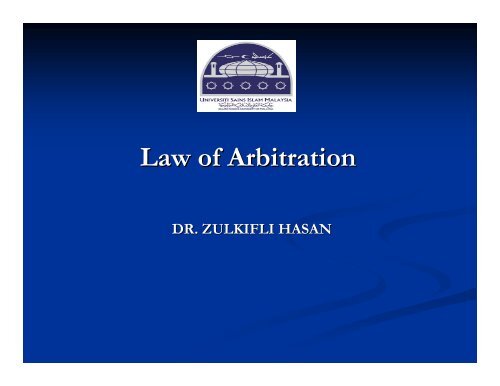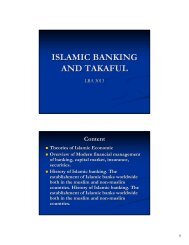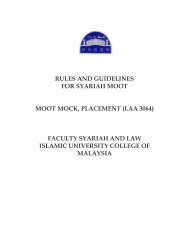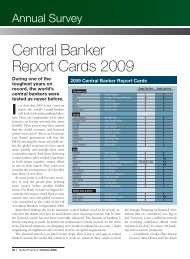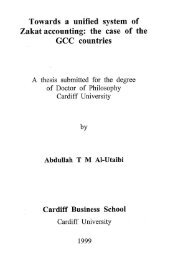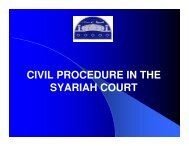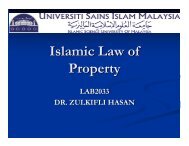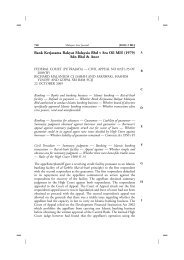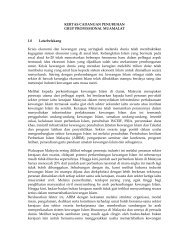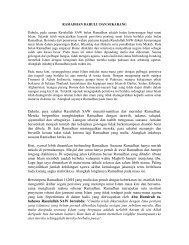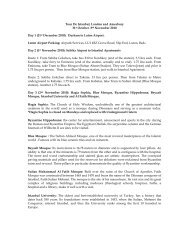Arbitration in Islamic Law
Arbitration in Islamic Law
Arbitration in Islamic Law
Create successful ePaper yourself
Turn your PDF publications into a flip-book with our unique Google optimized e-Paper software.
<strong>Law</strong> of <strong>Arbitration</strong><br />
DR. ZULKIFLI HASAN
Content<br />
<strong>Arbitration</strong> In <strong>Islamic</strong> <strong>Law</strong>
Introduction<br />
Sulh is a settlement grounded upon compromise<br />
negotiated by the disputants themselves or with the<br />
help of a third party.<br />
Islam encourages parties to use sulh <strong>in</strong> order to resolve<br />
their disputes:<br />
‘reconciliation between them, and reconciliation is<br />
better’ Verse 128 Sura Nisa<br />
‘If two parties among the Believers fall <strong>in</strong>to a quarrel,<br />
make ye peace between them . . . make peace between<br />
them with justice, and be fair: For God loves those who<br />
are fair and just.’ Verse 9 <strong>in</strong> Sura AlHujurat
Sulh and <strong>Arbitration</strong><br />
Sulh<br />
An amicable settlement may be<br />
reached between the parties<br />
with or without the<br />
<strong>in</strong>volvement of others<br />
the agreement of sulh is not<br />
b<strong>in</strong>d<strong>in</strong>g<br />
can only be resorted<br />
to if the dispute has already<br />
occurred<br />
<strong>Arbitration</strong><br />
the appo<strong>in</strong>tment of a third party<br />
is<br />
<strong>in</strong>dispensable<br />
B<strong>in</strong>d<strong>in</strong>g<br />
arbitration can address both<br />
exist<strong>in</strong>g and prospective<br />
disputes
Mejelle<br />
S 1844: ‘should the parties have authorised the<br />
arbitrators…to conciliate them, the agreement<br />
of the arbitrators is deemed to be a<br />
compromise…which the parties must accept’ as<br />
if they had compromised themselves’.<br />
S 1847:‘if a third party settles a dispute without<br />
hav<strong>in</strong>g been entrusted with this mission by the<br />
parties, and if the latter accept his settlement,<br />
the award shall be enforced’.
TAHKIM /ARBITRATION<br />
<strong>Islamic</strong> law allows parties to submit<br />
to arbitration to resolve disputes<br />
relat<strong>in</strong>g to property / private rights<br />
matters<br />
In<br />
Quran<br />
surah<br />
4:35 and a Hadith<br />
narrated by Ibn Hajar:<br />
” They are 2 representatives who can<br />
only act upon consent given by the<br />
parties…”<br />
In Malaysia, Hakam is very relevant <strong>in</strong><br />
<strong>Islamic</strong> Family <strong>Law</strong> matters<br />
eg: : S.48 of IFLA (FT)
ROLE OF HAKAM<br />
Hakam should:<br />
i) act justly <strong>in</strong> judg<strong>in</strong>g disputes<br />
between two parties<br />
ii)<br />
iii)<br />
iv)<br />
advice disput<strong>in</strong>g parties on the<br />
teach<strong>in</strong>gs of Islam<br />
decide the dispute submitted to<br />
him<br />
decide the disputes accord<strong>in</strong>g<br />
to law
WHO IS A HAKAM<br />
an authorised person to dispose of rights, to<br />
settle differences between different persons<br />
by suggest<strong>in</strong>g settlement or help<strong>in</strong>g them to<br />
reach it, or by issu<strong>in</strong>g a b<strong>in</strong>d<strong>in</strong>g decision to<br />
settle the dispute<br />
middle man<br />
Representative appo<strong>in</strong>ted by the court to<br />
resolve serious disputes between husband<br />
and wife<br />
Accord<strong>in</strong>g to Fiqh dictionary, Hakam means<br />
person who has been assigned to resolve<br />
disputes between spouses
HISTORICAL BACKGROUND<br />
In the pre-<strong>Islamic</strong> era, if there were<br />
disputes which led to no result,<br />
recourse was normally had to an<br />
arbitrator (hakam(<br />
hakam)<br />
Arbitrator did not belong to a<br />
particular caste and parties were free<br />
to appo<strong>in</strong>t anyone whom they agreed<br />
An arbitrator was chosen for his<br />
personal qualities, reputation and<br />
usually belonged to a family famous<br />
for their competence <strong>in</strong> decid<strong>in</strong>g<br />
disputes
cont’d<br />
An arbitrator were also known for his<br />
supernatural powers, commonly<br />
found <strong>in</strong> soothsayers (kah<strong>in</strong>(<br />
kah<strong>in</strong>)<br />
Parties had to agree not only on the<br />
choice of arbitrator, but also the<br />
cause of action which they were to<br />
submit to him<br />
If the kah<strong>in</strong> agreed to act, each party<br />
had to provide a security (property)<br />
as a guarantee
cont’d<br />
that they would abide by his decision<br />
• The decision of hakam was f<strong>in</strong>al but it<br />
was not an enforceable judgment (it<br />
was only a statement of right on a<br />
disputed po<strong>in</strong>t)<br />
• However, it is said that the arbitral<br />
awards of the arbitrators appo<strong>in</strong>ted <strong>in</strong><br />
the ukaz (a fair held periodically <strong>in</strong><br />
Makkah) ) were customarily b<strong>in</strong>d<strong>in</strong>g on<br />
disputants
ARBITRATION<br />
A dispute between the sheikhs of<br />
Mecca over the plac<strong>in</strong>g of a holy black<br />
stoneBetween<br />
Ali and Mu’awiya<br />
Mu’awiya<br />
refused to submit to the caliphate<br />
of Ali which resulted <strong>in</strong>to the battle of Siff<strong>in</strong><br />
Dur<strong>in</strong>g the course of the battle, both parties<br />
wished that the matter could be settled<br />
through arbitration<br />
Each side nom<strong>in</strong>ated its arbitrator, Abu Musa<br />
represented Ali, Amar ibn Al-Aas<br />
Aas represented<br />
Mu’awiya
cont’d<br />
The arbitration agreement <strong>in</strong> the<br />
document conta<strong>in</strong>ed, place of<br />
arbitration, applicable law, rules of<br />
procedure, provision for the<br />
appo<strong>in</strong>tment of a substitute arbitrator<br />
if the one appo<strong>in</strong>ted died
QUALIFICATIONS OF<br />
ARBITRATOR<br />
Generally, he must possess the same<br />
qualifications as that of qadi namely:<br />
i)sane and adult<br />
ii)A A male (Hanafis(<br />
allow a woman also<br />
to act qadi <strong>in</strong> matters not <strong>in</strong>volv<strong>in</strong>g<br />
hadd and qisas)<br />
iii)A A Muslim (Hanafis(<br />
allow a non-<br />
Muslim to act as an arbitrator)
cont’d<br />
iv) He must be <strong>in</strong>telligent, free and adil<br />
v) He must be learned <strong>in</strong> Shariah<br />
vi)Family members (from the husband<br />
and wife side)
Who is fit to hold the position<br />
Said<strong>in</strong>a Ali wrote to Malik al Ashtar as under:<br />
"Select, as your chief judge from the people, one who is by far<br />
the best among them - one who is not obsessed with domestic<br />
worries, one who cannot be <strong>in</strong>timidated, one who does not err<br />
too often, one who does not turn back from the right path once<br />
he f<strong>in</strong>ds it, one who is not self-centered or avaricious, one who<br />
will not decide before know<strong>in</strong>g the full facts, one who will<br />
weigh with care every attendant doubt and pronounce a clear<br />
verdict. after tak<strong>in</strong>g everyth<strong>in</strong>g <strong>in</strong>to full consideration, one who<br />
will not grow restive over the arguments of advocates and who<br />
will exam<strong>in</strong>e with patience every new disclosure of fact and who<br />
will be strictly impartial <strong>in</strong> his decision, one whom flattery<br />
cannot mislead, one who does not exult over his position. But<br />
such people are scarce".
COMPARISON<br />
Subject<br />
Nature of<br />
arbitration<br />
agreement<br />
English law<br />
S.9(3) Arb.<br />
Act 2005 – it<br />
shall be <strong>in</strong><br />
writ<strong>in</strong>g<br />
Reference to<br />
present and<br />
future dispute<br />
<strong>Islamic</strong> law<br />
Oral<br />
agreements<br />
are valid but<br />
preferable to<br />
be <strong>in</strong> writ<strong>in</strong>g<br />
Future dispute<br />
cannot form<br />
part of<br />
arbitration<br />
agreement –<br />
uncerta<strong>in</strong>ty
Subject<br />
<strong>Arbitration</strong><br />
agreement –<br />
b<strong>in</strong>d<strong>in</strong>g /non<br />
b<strong>in</strong>d<strong>in</strong>g<br />
Qualifications<br />
of arbitrator<br />
English law<br />
B<strong>in</strong>d<strong>in</strong>g<br />
Freedom to<br />
the parties to<br />
choose<br />
<strong>Islamic</strong> <strong>Law</strong><br />
Can be<br />
revoked up to<br />
the time the<br />
arbitrator has<br />
given his<br />
award/appo<strong>in</strong><br />
tment has<br />
been<br />
confirmed<br />
Must possess<br />
the same<br />
qualifications<br />
as qadi


